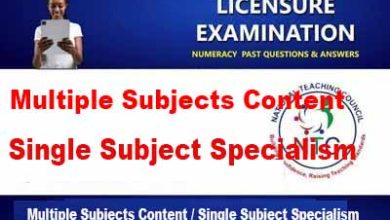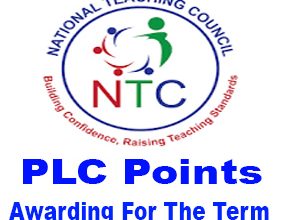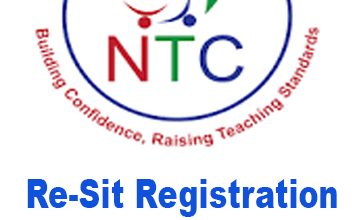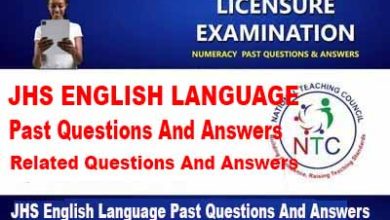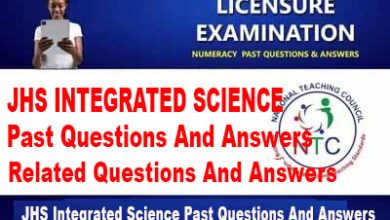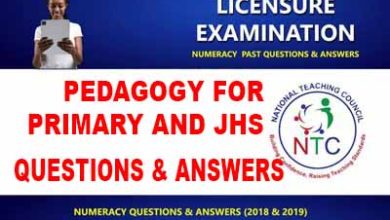NTC Literacy Past Question And Answer 2023 ( Conditional Sentences)
NTC Essential Skills Past Question And Answer 1
1. What is the basic structure of a zero conditional sentence?
a) If + past simple, past simple
b) If + present simple, present simple
c) If + future simple, future simple
d) If + past continuous, past continuous
Answer: b) If + present simple, present simple
NTC Literacy Past Question And Answer 2023 ( Conditional Sentences)
NTC Literacy Past Question And Answer 2023 ( Conditional Sentences 2)
NTC Literacy Past Question And Answer 2023 (Subject- Verb agreement) 1
2. When is the zero conditional used?
a) To express hypothetical situations
b) To discuss past events
c) To express general truths and scientific facts
d) To talk about future possibilities
Answer: c) To express general truths and scientific facts
3. Which of the following is an example of a general truth in the zero conditional?
a) If I win the lottery, I will buy a new car.
b) If you work hard, you may succeed.
c) If you mix red and blue, you get purple.
d) If I had more time, I would travel.
Answer: c) If you mix red and blue, you get purple.
3. In the zero conditional, what can “if” be replaced with in spoken English, especially when discussing routines or habits?
a) Only “whether”
b) Only “unless”
c) “When” or “unless”
d) “When” or “whether”
Answer: c) “When” or “unless”
NTC Literacy Past Question And Answer 2023 ( Conditional Sentences)
NTC Literacy Past Question And Answer 2023 ( Conditional Sentences 2)
NTC Literacy Past Question And Answer 2023 (Subject- Verb agreement) 1
4. Which of the following is NOT a common use of the zero conditional?
a) Expressing general truths
b) Stating hypothetical situations
c) Describing scientific facts
d) Discussing laws of nature
Answer: b) Stating hypothetical situations
5. Which of the following sentences is in the zero conditional form?
a) If I see him tomorrow, I will ask him.
b) If you don’t study, you won’t pass the exam.
c) If you add salt to water, it dissolves.
d) If it rains, I’ll bring an umbrella.
Answer: c) If you add salt to water, it dissolves.
NTC Literacy Past Question And Answer 2023 ( Conditional Sentences)
NTC Literacy Past Question And Answer 2023 ( Conditional Sentences 2)
NTC Literacy Past Question And Answer 2023 (Subject- Verb agreement) 1
6. In a zero conditional sentence, which part of the sentence expresses the result?
a) The “if” clause
b) The subject
c) The main clause
d) The conjunction
Answer: c) The main clause
8. The zero conditional is used to discuss situations that are:
a) Hypothetical and variable
b) Past events and actions
c) Always true and consistent
d) Based on personal opinions
Answer: c) Always true and consistent
NTC Literacy Past Question And Answer 2023 ( Conditional Sentences)
NTC Literacy Past Question And Answer 2023 ( Conditional Sentences 2)
NTC Literacy Past Question And Answer 2023 (Subject- Verb agreement) 1
9. Which of the following is an example of a scientific fact in the zero conditional?
a) If you exercise regularly, you will stay healthy.
b) If you mix baking soda and vinegar, it produces a chemical reaction.
c) If it’s sunny, we will go to the beach.
d) If you call me, I’ll answer.
Answer: b) If you mix baking soda and vinegar, it produces a chemical reaction.
10. In the zero conditional, the condition and result can be presented in which order?
a) Present continuous, if present simple
b) Past simple, if past continuous
c) Present simple, if present simple
d) Future simple, if future perfect
Answer: c) Present simple, if present simple
NTC Literacy Past Question And Answer 2023 ( Conditional Sentences)
NTC Literacy Past Question And Answer 2023 ( Conditional Sentences 2)
NTC Literacy Past Question And Answer 2023 (Subject- Verb agreement) 1
11. Which of the following is a use of the zero conditional?
a) To express hypothetical dreams and wishes
b) To talk about personal opinions
c) To describe events in a story
d) To discuss established rules or regulations
Answer: d) To discuss established rules or regulations
12.. What does the zero conditional sentence structure convey?
a) Uncertainty
b) Hypothetical situations
c) Certainty and facts
d) Future possibilities
Answer: c) Certainty and facts
13. Which sentence demonstrates the correct structure of the zero conditional?
a) If she will eat dinner, she is hungry.
b) If the sun shines, we are going for a picnic.
c) If you will mix red and blue, you get purple.
d) If it rains, we will stay indoors.
Answer: b) If the sun shines, we are going for a picnic.
NTC Literacy Past Question And Answer 2023 ( Conditional Sentences)
NTC Literacy Past Question And Answer 2023 ( Conditional Sentences 2)
NTC Literacy Past Question And Answer 2023 (Subject- Verb agreement) 1
14. In the zero conditional, what type of situations does it typically address?
a) Unique events
b) Past experiences
c) Universal truths and consistent facts
d) Future possibilities
Answer: c) Universal truths and consistent facts
15. What is the primary purpose of using the zero conditional?
a) To create suspense in storytelling
b) To discuss imaginary scenarios
c) To express certainty about known facts
d) To express personal opinions
Answer: c) To express certainty about known facts
16. Which of the following is an example of a law of nature or physical principle in the zero conditional?
a) If you don’t hurry, you’ll miss the bus.
b) If you mix oil and water, they don’t mix.
c) If I win the lottery, I’ll buy a mansion.
d) If he calls me, I’ll be surprised.
Answer: b) If you mix oil and water, they don’t mix.
NTC Literacy Past Question And Answer 2023 ( Conditional Sentences)
NTC Literacy Past Question And Answer 2023 ( Conditional Sentences 2)
NTC Literacy Past Question And Answer 2023 (Subject- Verb agreement) 1
17. What can be interchanged with “if” in the zero conditional when discussing routines or habits?
a) “When”
b) “Unless”
c) “Only if”
d) “Although”
Answer: a) “When”
18. Which of the following is NOT a suitable use of the zero conditional?
a) Expressing known facts
b) Discussing consistent truths
c) Speculating about the future
d) Describing scientific laws
Answer: c) Speculating about the future
19. In the zero conditional, the result always follows the condition because it deals with:
a) Hypothetical scenarios
b) Established facts and truths
c) Personal preferences
d) Uncertain possibilities
Answer: b) Established facts and truths
NTC Literacy Past Question And Answer 2023 ( Conditional Sentences)
NTC Literacy Past Question And Answer 2023 ( Conditional Sentences 2)
NTC Literacy Past Question And Answer 2023 (Subject- Verb agreement) 1
20. Which of the following sentences demonstrates the correct structure for the zero conditional?
a) If the train is late, we’ll miss our flight.
b) If we mix red and blue, you get purple.
c) If she would call me, I would be happy.
d) If I had more time, I will travel.
Answer: b) If we mix red and blue, you get purple.
21. What is the basic structure of a First Conditional sentence?
a) If + past simple, will + base form of the verb
b) If + present simple, will + base form of the verb
c) If + future simple, will + base form of the verb
d) If + present continuous, will + base form of the verb
Answer: b) If + present simple, will + base form of the verb
22. When is the First Conditional used?
a) To talk about past events
b) To express hypothetical situations
c) To discuss real and likely future situations
d) To state general truths
Answer: c) To discuss real and likely future situations
NTC Literacy Past Question And Answer 2023 ( Conditional Sentences)
NTC Literacy Past Question And Answer 2023 ( Conditional Sentences 2)
NTC Literacy Past Question And Answer 2023 (Subject- Verb agreement) 1
23. Which of the following sentences is an example of the First Conditional?
a) If I won the lottery, I would buy a yacht.
b) If you eat your vegetables, you’ll grow strong.
c) If it snows tomorrow, I would go skiing.
d) If I have lunch now, I had dinner later.
Answer: b) If you eat your vegetables, you’ll grow strong.
24. In the First Conditional, what does the “will” auxiliary verb express?
a) Past actions
b) Hypothetical scenarios
c) Certainty about a future event
d) Present habits
Answer: c) Certainty about a future event
25. Which of the following is NOT a use of the First Conditional?
a) Making predictions based on a present condition
b) Expressing hypothetical wishes
c) Discussing real and likely future situations
d) Talking about consequences of present actions
Answer: b) Expressing hypothetical wishes
NTC Literacy Past Question And Answer 2023 ( Conditional Sentences)
NTC Literacy Past Question And Answer 2023 ( Conditional Sentences 2)
NTC Literacy Past Question And Answer 2023 (Subject- Verb agreement) 1
26. What is the result clause in a First Conditional sentence?
a) The “if” clause
b) The subject
c) The main clause
d) The conditional clause
Answer: c) The main clause
27. Which of the following sentences correctly follows the First Conditional structure?
a) If it snows tomorrow, I will went skiing.
b) If she calls me, I will meeting her later.
c) If he studies hard, he would pass the exam.
d) If it rains, I will bring an umbrella.
Answer: d) If it rains, I will bring an umbrella.
28. The First Conditional is primarily used to discuss situations that are:
a) Past events
b) Hypothetical and imaginary
c) Real and likely to happen in the future
d) Unpredictable
Answer: c) Real and likely to happen in the future
29. In the First Conditional, the “if” clause typically describes a condition in the:
a) Past
b) Present
c) Future
d) Hypothetical world
Answer: b) Present
30. What is the key purpose of using the First Conditional?
a) To talk about unreal or imaginary situations
b) To discuss historical events
c) To make predictions about future events based on present conditions
d) To express general truths
Answer: c) To make predictions about future events based on present conditions
NTC Literacy Past Question And Answer 2023 ( Conditional Sentences)
NTC Literacy Past Question And Answer 2023 ( Conditional Sentences 2)
NTC Literacy Past Question And Answer 2023 (Subject- Verb agreement) 1
31. What is the basic structure of a Second Conditional sentence?
a) If + past simple, would + base form of the verb
b) If + present simple, will + base form of the verb
c) If + future simple, would + base form of the verb
d) If + past continuous, would + base form of the verb
Answer: a) If + past simple, would + base form of the verb
32. When is the Second Conditional typically used?
a) To discuss real and likely future situations
b) To express general truths
c) To talk about unreal or unlikely situations in the present or future
d) To make predictions based on a present condition
Answer: c) To talk about unreal or unlikely situations in the present or future
33. Which of the following sentences is an example of the Second Conditional?
a) If you eat your vegetables, you’ll grow strong.
b) If I won the lottery, I would travel the world.
c) If it’s sunny tomorrow, we’ll have a picnic.
d) If I had lunch now, I’ll skip dinner.
Answer: b) If I won the lottery, I would travel the world.
NTC Literacy Past Question And Answer 2023 ( Conditional Sentences)
NTC Literacy Past Question And Answer 2023 ( Conditional Sentences 2)
NTC Literacy Past Question And Answer 2023 (Subject- Verb agreement) 1
34. In the Second Conditional, what does the “would” auxiliary verb express?
a) Past actions
b) Certainty about a future event
c) Unreal or hypothetical situations
d) Present habits
Answer: c) Unreal or hypothetical situations
35. Which of the following is NOT a common use of the Second Conditional?
a) Making predictions based on a present condition
b) Talking about unreal or unlikely situations
c) Expressing hypothetical wishes
d) Discussing present or past actions
Answer: a) Making predictions based on a present condition
36. What is the result clause in a Second Conditional sentence?
a) The “if” clause
b) The subject
c) The main clause
d) The conditional clause
Answer: c) The main clause
NTC Literacy Past Question And Answer 2023 ( Conditional Sentences)
NTC Literacy Past Question And Answer 2023 ( Conditional Sentences 2)
NTC Literacy Past Question And Answer 2023 (Subject- Verb agreement) 1
37. Which of the following sentences correctly follows the Second Conditional structure?
a) If it’s sunny tomorrow, we’ll have a picnic.
b) If he calls me, I would meet him later.
c) If I win the race, I will take the prize.
d) If I were taller, I would reach the top shelf.
Answer: d) If I were taller, I would reach the top shelf.
38. The Second Conditional is primarily used to discuss situations that are:
a) Past events
b) Real and likely to happen in the future
c) Hypothetical and unlikely in the present or future
d) Unpredictable
Answer: c) Hypothetical and unlikely in the present or future
39. In the Second Conditional, the “if” clause typically describes a condition that is:
a) Past
b) Present
c) Future
d) Always true
Answer: a) Past
NTC Literacy Past Question And Answer 2023 ( Conditional Sentences)
NTC Literacy Past Question And Answer 2023 ( Conditional Sentences 2)
NTC Literacy Past Question And Answer 2023 (Subject- Verb agreement) 1
40. What is the key purpose of using the Second Conditional?
a) To talk about real and likely future events
b) To express general truths
c) To discuss unreal or unlikely situations in the present or future
d) To make predictions about the past
Answer: c) To discuss unreal or unlikely situations in the present or future

